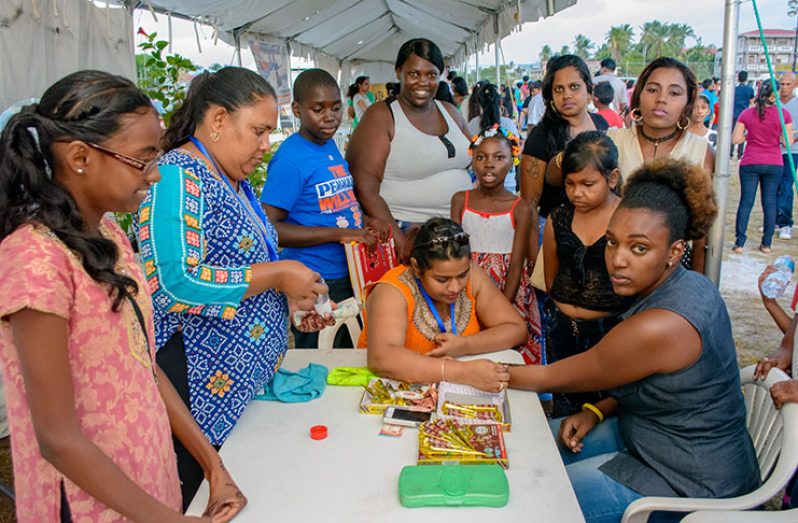– President Granger
THE SHIPMENT of more than 240,000 East Indians to work on sugar plantations in British Guiana during the 19th Century transformed the culture, demography and political economy

of this country which now boasts a multi-ethnic status.
Deafening silence and attentiveness from thousands of Guyanese – predominantly Indians – allowed those words to resonate with much meaning and significance.
Perhaps, it was not only what was being said, but rather, who was saying it – President David Granger, a historian.
He was at the time addressing a few thousand people who gathered at the National Track and Field Centre at Leonora,at a mela and cultural show to observe the 100th year of the abolition of indentureship in Guyana.
In an unorthodox style, the President’s voice faded intermittently. It was largely due to the fact that his speech was passionately delivered, evidenced in his fluctuating tone.
What was sure was that many, even children, were reminded and some educated for the first time about the “cruel phase” in this country’s history known indentureship.

Through this system of indentureship, more than 3.5 million East Indian were exported to tropical colonies in the 19th Century to work on sugar plantations owned and controlled by European empires.
This mass exportation, which was similar that that of slavery, was described by the President as “trafficking in persons”.
“It was trafficking in persons… if they did that today they would be charged. It was a cruel phase in our history and the history of the world,” he told the gathering.
The historian said like African slaves, the Indians resisted the abuse, brutality, oppression, violence and confinement on the plantations.
NEVER FORGET
As descendants of these immigrants listened attentively, President Granger urged them never to forget how their foreparents were brought here.
“We should not forget how we got here. We got here by the blood and sweat of our foreparents,” he said, adding that Indians recreated familiar conditions in British Guiana to ensure survivability.
About 70 per cent of Indian immigrants who came to British Guyana would eventually remain after their indentureship contract had expired.
Though the system was cruel and oppressive, he optimistically remarked that indentureship serves as a reminder of the value that needs to be placed on human dignity, human equality and human liberty.
But one good which may have come out of the arrangement of indentureship, was Indian immigration, which the President said transformed the culture, demography and the political economy of what used to be British Guiana.
The President noted that this group of people would venture into different spheres of life, including business and politics,where they contributed significantly to the development of the country.
He offered too that the immigration of this ethnic group transformed other ethnic groups including Africans, Chinese, Portuguese and others,who shared and contributed to its culture.
“It transformed the lives of the people who were living here from time immemorial. Today, we enjoy peaceful and friendly relations in Guyana. We are living in an oasis of peace,” he pleasantly remarked.
NATIONAL DAY
To this end, the head-of-state declared that March 12th will be announced as a national day for the observance of the abolition of Indian indentureship in Guyana.
In a similar tone, Opposition Member of Parliament Irfaan Ali delivered a fiery speech which called on Indians to ensure they continue to contribute to the development of what he described as a “collective society”.
Ali noted that collective unity also must be achieved, but that this could only happen when there is collective purpose and unity.
He also touched on the contributions of Indians in the area of agriculture which he said must always be acknowledged.
The show also featured numerous cultural items, many of which were done in the form of song and dance. Contributions were made by the three dominant religious groups in Guyana – Hindus, Muslims and Christians. Several booths showcasing the rich Indian culture were also on display at the event.
The curtains were drawn with the beautiful display of fireworks by the Guyana Defence Force (GDF),which also entertained the patrons with a spectacular parachuting exercise.




.png)









